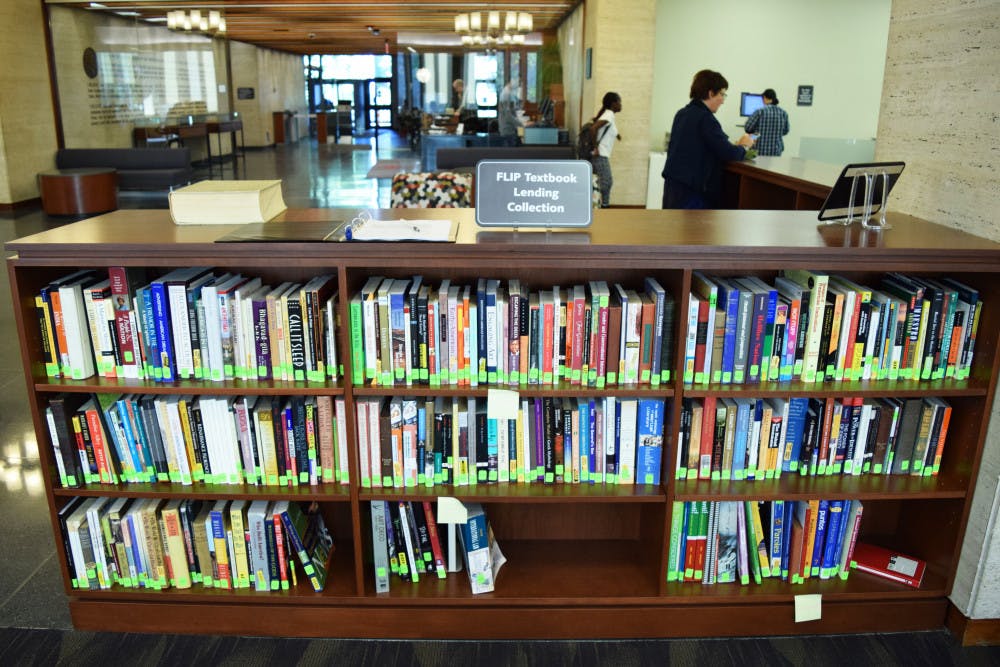The First Generation Low Income Partnership library, which launched at the beginning of the semester, aims to make textbooks accessible to those who are unable afford the cost of books, said coordinators Jonathan Jaramillo ’18 and Kevin Melendez ’16.
The library, located in the Sorensen Family Reading Room on the first floor of the Rockefeller Library, currently offers over 500 donated textbooks, covering a range of disciplines. Students can access a list of textbooks and check their availability via an online spreadsheet on the program’s Facebook page. Most books can be checked out on a semester-long basis.
Melendez said his own experiences motivated him to help launch the program. He once asked a question during a lecture, to which the professor responded: “If you had done the reading, you would’ve known the answer to this question.”
“It was used as a joke for the class,” Melendez said, adding that he approached the professor after the class and told him that he could not read the chapter because the book available in the library was not the latest version.
Melendez’s experience of relying on Brown libraries or resorting to alternative methods to avoid the high cost of textbooks is not unique, both organizers said.
“I came in freshman year and realized that my shopping period was being influenced a lot by which classes had more affordable books, (and) which classes didn’t require books. It got to the point where I chose two of my classes because they didn’t require books at all,” Jaramillo said.
“When I realized that it was more common than you would suspect, I immediately realized that we needed to do something about it,” Jaramillo added.
Jaramillo and Melendez, partially inspired by a similar program at Columbia, started a subcommittee of First-Gens@Brown in May to organize a completely independent, student-run program housed at the Rock.
Melendez and Jaramillo said their success in launching the program could be attributed in part to the responsiveness of administrators.
The organizers were able to meet with the appropriate administrators within a week of initial contact. “The administration was really on this with us,” Jaramillo said.
Kimberly Silva, Rockefeller circulation manager, said though the Rock has been an active participant in launching the program, the student coordinators have taken a major role in getting it off the ground.
After obtaining initial approval from the Rock, Melendez and Jaramillo began a campus-wide collection drive in the basement of the Stephen Robert ’62 Campus Center. When boxes at the textbook drive began to overflow with donated books, the organizers knew that the Brown community was ready for the program, Jaramillo added.
Despite this response from the community, Melendez and Jaramillo did face some initial opposition to the program.
“The (Brown Bookstore) really pushed back because they make their revenue off of textbooks,” Melendez said, adding that professors who assign their own works for classes may also be frustrated by the program.
But “so long as these books were donated and not sold for a profit,” Jaramillo said, “they couldn’t touch us.”
A representative from the Bookstore could not be reached for comment by press time.
Once Melendez, Jaramillo and their team were able to get the program up and running, interest began growing.
“Even before it was well-known to the Brown community, it was already getting a lot of use and interest,” Silva said.
The library’s exact role in this program is more facilitative than managerial, Silva said. Though library staff members will assist students with navigating the collection and connecting with the program’s student coordinators, they are not responsible for the collection’s upkeep.
Jaramillo and Melendez said they have received positive feedback from students who have used the FLIP library, adding that over 70 books have been checked out this semester so far.
“People will stop me in the middle of going to class (saying), ‘Dude, you just saved me $200,’ and that’s a great feeling,” Jaramillo said.
Alex Nibley ’19 said he saved more than $60 by using the FLIP library.
Melendez said he estimates that in the lending library’s first two weeks, it has saved students over $800.
The system “was extremely easy to figure out,” Nibley said.“They’re very responsive to making it as good as it can be.”
“It’s all a work in progress … but the foundation is there and I think that we have a good turnover of students in the first-gen community that will keep this up and running,” Melendez said. “I think when we get the next roundup of textbooks, our collection will double or triple, and in semesters following, we’ll have a lot more students use the library.”
In addition to the FLIP library, First-Gens@Brown is starting a book fund and various other programs to address the resource gap that exists at the University, Melendez said. Though many first-generation college students receive full tuition assistance from Brown, other costs — such as books — tend to add up, he said.
Students who are not paying for college are having to take out loans to pay for other expenses, “which doesn’t make sense,” Jaramillo added.
Jaramillo, Melendez and other members of First-Gens@Brown are committed to closing the resource gap so that “everyone can be on a level playing field, at least economically,” Melendez said.





